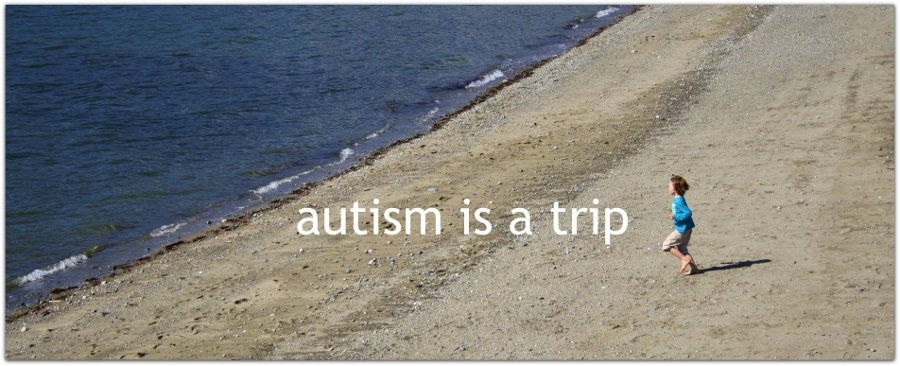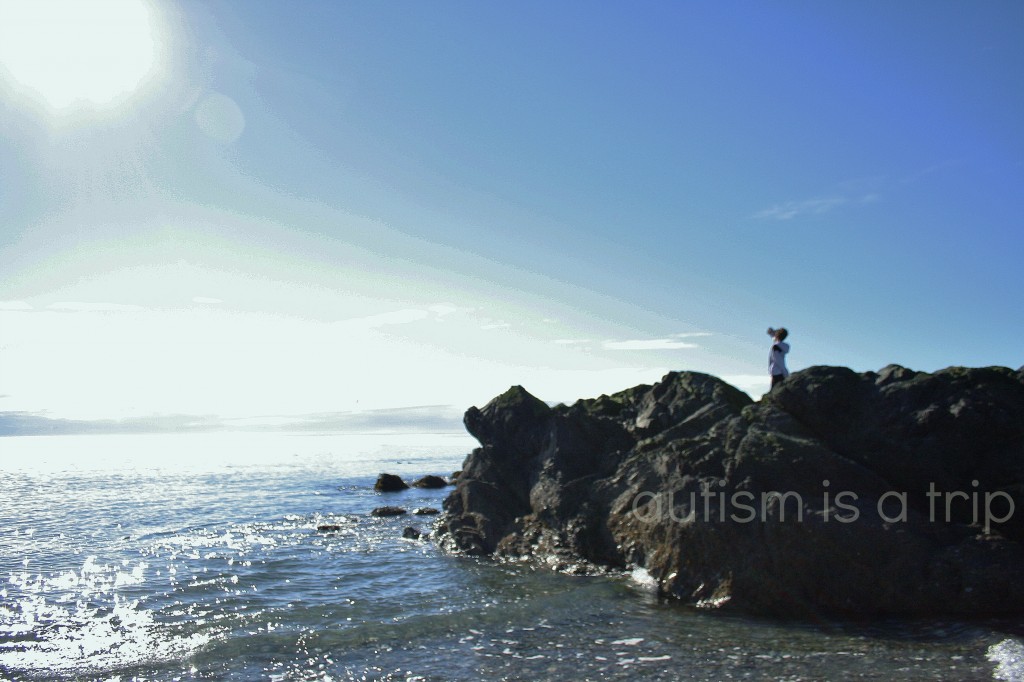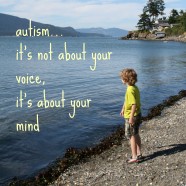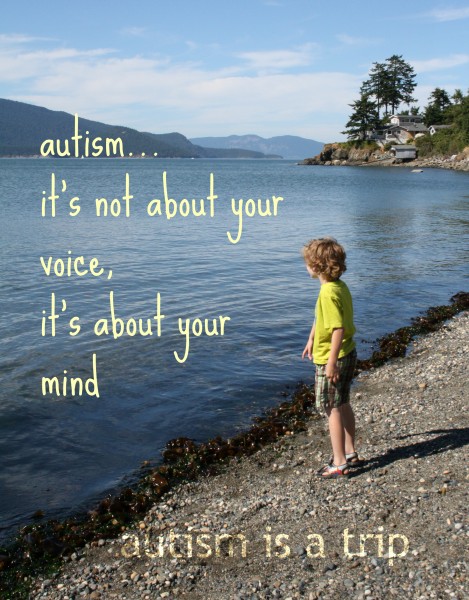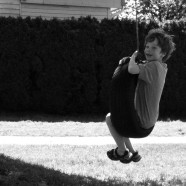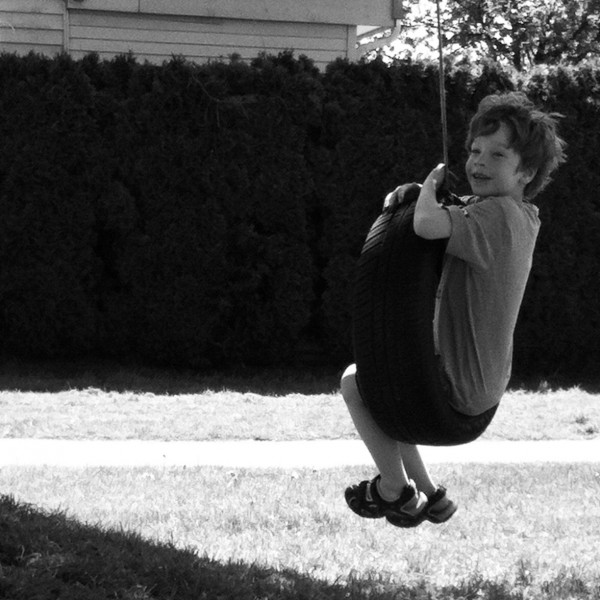Be The Village
Autism parents. Autistic adults.
Two communities that have the same essential goals, but are rarely able to meet on common ground.
One point of contention is the internet, and how autistic people are portrayed.
The latest flame on that fire is a video by Kate Swenson of Finding Cooper’s Voice, wherein she talks about her son Cooper’s nonverbal autism.
Kate’s website, Finding Cooper’s Voice, rose in visibility last year, when her video about an altercation at a special needs playground went viral. Then, in October, Kate and Cooper’s video submission to Jimmy Fallon and Today’s “Everything is Mama” contest took the top prize.
Kate makes a lot of videos about her family, and Cooper, in particular.
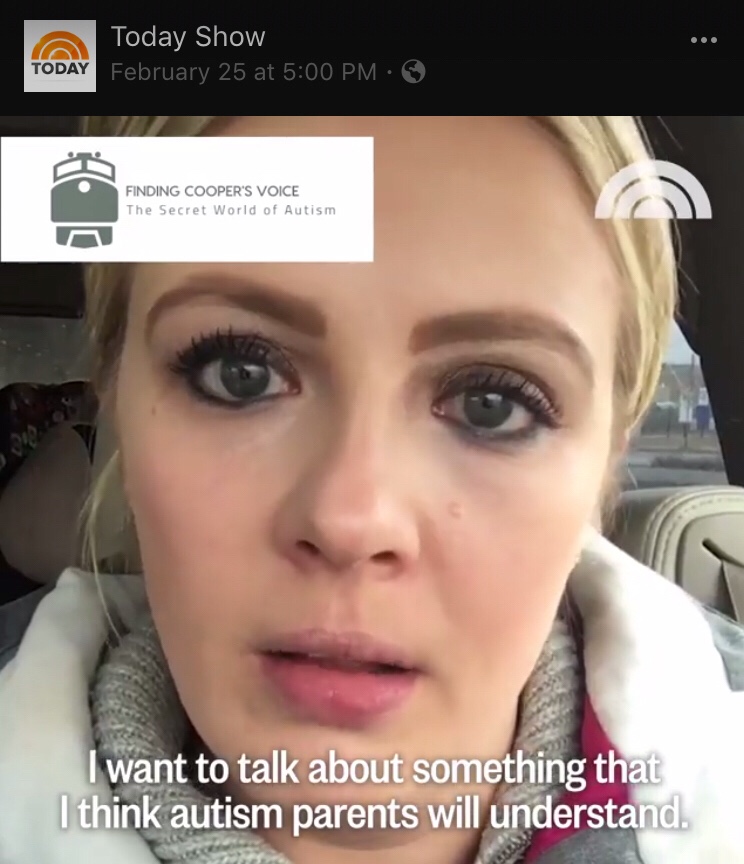
Kate’s latest video
This latest video, posted via Today.com, as caught a lot of attention, both good and bad. Parents of nonverbal children understand and sympathize, and a lot of autistic people are very, very upset.
The main concerns I’ve seen are that the video is “ableist,” “exploitative,” and essentially a Mommy Blog pity party.
And they’re right, to a point.
People have been arguing since the invention of the internet whether or not posting videos/photos of their children is acceptable. Some think it’s absolutely abhorrent, while others embrace the platform with abandon.
There is a lot of concern about Cooper’s right to privacy, and future humiliation he may suffer because of his mother’s posts and videos. I, myself, have faced similar scrutiny, particularly when I started this site, eight years ago. I take care not to post anything that disrespects or would embarrass my children, and from what I’ve seen of Kate’s work, she does the same.
My opinion. Yours may vary.
I think the situation here is a little more serious than whether or not Kate is indulging in self-pity at Cooper’s expense.
This is also about more than Cooper’s right to privacy.
This is about his life.
People like to say that special needs parents are “picked” for their children, or that “God never gives them more than they can handle.”
Those are nice tropes, but in reality, parents of special needs children are no different or better or more special than any other parent. Every parent wants the best for their child, and sometimes that journey is a lot harder and full of stress.
A kind of stress you can’t explain to someone not in it.
Even another autistic person.
I am autistic, and I am also a parent. A parent with four children, three of whom have special diagnoses, two of whom are on the spectrum, too.
I understand that to an autistic person, hearing a parent say “horrible things” about their autistic child is “ableist” and offensive.
I also understand, as a parent to autistic children, that hearing a parent describe their reality is hard to hear, but necessary.
This is a cry for help. For her, for her child.
Instead of vilifying her, let’s recognize that and be her village.
Kelly Stapleton was an integral part of the autism blogosphere. She was a bright and shining light, while simultaneously sharing her struggles with her daughter Izzy.
Her life was hard. Really, really hard. And when Kelli thought she had nowhere left to turn, and nobody left to help her family, she made a desperate decision that changed her family’s lives forever.
She tried to kill Izzy, and herself.
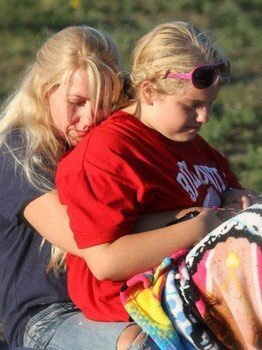
Kelli and Izzy
Kelli got to the point where that action seemed like a logical ending to their pain. To her pain.
I am in no way condoning her actions. Not at all.
However, I think we need to learn from them. There has been an epidemic of caregivers taking the lives of their autistic children/wards, most because they can’t find a way out of their world.
The autism world can be one of utter isolation. Family and friends back off; total strangers judge silently.
As autistic adults, we purport to want the very best for our fellow autistics of all ages. It’s time to put some walk to that talk. It’s time to reach across the table with an olive branch and a life jacket.
We simply cannot have it both ways. If we do not reach out and support parents who are desperate and in pain, they may break. Supporting these parents, instead of ridiculing and criticizing them, IS supporting autistic people.
How can we possibly insist on putting the health and welfare of autistic people first, if we are not willing to help their caregivers?
We know best. We are their children, grown up. We know what our parents went through, and it wasn’t always easy. Would you have wished them to suffer in silence, or to reach out for a hand to hold or shoulder to cry on or simply a sympathetic ear?
We can do better. For Cooper. For Izzy. For every autistic child. They need our village.
Share this: Twitter | StumbleUpon | Facebook | digg | reddit | eMail Read MoreA Tragedy in BC – Failing The Caregivers
Autism Awareness (ought to be Acceptance) Month is winding down, and unlike April, it will not go out like a lamb. The lion of autism injustice is still roaring, louder than ever.
While people are walking and gathering and fundraising and celebrating the wonders and gifts of autism (which I wholeheartedly support), the dark underbelly is growing. It’s time for us to face it.
Death has become altogether too common in the autism community. Every week or so there’s another story about an individual who has bolted or wandered and not made it home. And every month or so, an autistic individual is harmed or murdered by a caregiver.
The tragedies are too numerous to count, and happening much too often. They are also hitting closer to home – both in proximity and emotion.
Our children are in danger.
Issy Stapleton. Alex Spourdalakis. And now, Robert Robinson.
Last week, British Columbia resident Angie Robinson murdered her 16-year-old autistic son, then took her own life.
It’s easy to automatically blame Angie. How could a mother possibly take the life of her own child? What kind of parent does that?
A desperate parent. A parent who has reached the end of their resources, both physically and mentally. A parent who believes they have absolutely no other answer.
Nobody thinks they could ever get to the point where suicide and murder are a viable option. We all assume if things get dark enough, someone will appear with a light.
No parent, even a parent of a profoundly disabled or autistic child, wants death (I’m assuming the best, of course). Even at the very end of the rope, we are still hanging on, holding out for a glimpse of hope.
But occasionally, the darkness consumes everything, and no light can get through. There is no hope. Or, at least, that’s what a desperate parent believes.
Yes, the violent acts visited on children by their own parents and caregivers is atrocious and unimaginable. No child should ever fear for his or her life in their own home. I am not suggesting that what Kelly or Angie or Alex’s grandmother did are acceptable in any way.
But I do understand them. And I can understand how things could get so desperate for them that they felt they only had one solution.
It all comes down to support. The proverbial village. The village that supports the child needs to support the caregivers and parents, too, and therein lies the rub.
Autism supports vary from country to country, province to provice. There is no standard of practice or care even within a the US or Canada. Children and individuals with autism often need intense, one on one care, either in the home or a residential facility. Not every family is equipped to handle these situations, yet there is often little in the way of respite and support for them.
As far as I can tell, support for caregivers is pretty much nonexistent. If a family member requires placement or full-time care and none is available, what is the caregiver to do? Between a lack of professional support and the overwhelming costs of respite and residential care, it should really be no surprise that parents are losing hope.
There are two victims in these crimes. Two lives lost. Two stories that didn’t have to end this way.
When a desperate parent decides to kill their child and themselves as a way out, the entire autism community has failed.
We have failed the child by not giving them everything they need to live a happy life to best of their ability.
We have also failed the caregiver by not recognizing that a healthy caregiver is essential to a healthy, happy autistic individual.
We cannot expect autistics and their families to survive and thrive if they are constantly at war just to get support.
Any one of us could reach the limit. Or anyone we’ve met. Nobody knows just how much someone can take, and what will be their breaking point. We need wholesale change in the way we support autistic individuals and their caregivers. The reality is if the caregiver is too stressed and is getting no help or relief, the whole family is in potential danger. These horrible stories will continue until something big changes.
Caregivers need to be heard and helped when they reach out. By the time a parent reaches the point of murder and suicide, it’s too late. Families need care and support from the very beginning, not just when things get rough.
Until then, keep your ears and shoulders available for your friends, in real life and on the internet (which is oftentimes who need it the most). Be a friend, be aware of what’s happening. Also, don’t hide your situation from the world. Open up to anyone you think will take you seriously.
And let your local government know how you feel about caregiver support and the lack thereof. Be loud, and be heard.
If the system can’t/won’t help us, we have to help ourselves.
Share this: Twitter | StumbleUpon | Facebook | digg | reddit | eMail Read MoreExtreme Air Park – Hostility, Greed, and Autism
We in the autism community are, sadly, used to hearing about maligned special needs parents and children. It’s become an all-too-common topic in the news and blogs lately. While most of us know or are familiar with some affected persons, it’s rare (at least for me) to have a situation happen right in your own backyard.
Or down the street, in my case.
We live in Langley, British Columbia, just South of Vancouver. From what I’ve experienced in the almost four years we’ve lived here, it’s a really nice community. The people are kind, the schools are good, and children are welcomed almost everywhere. We have parks and playgrounds and activities for families on almost every corner. It’s not Utopia, but it’s a great place to raise a family.
As a child with autism, Jack is welcome with all other children. He has not been excluded from anything he has wanted to do, to our knowledge. He is gaining independence, but he does need accompaniment of his SEA for school activities, and a parent or caregiver for much of everything else.
Kelly Moonie and her son Kyle live in our community. Kyle, like Jack, has autism. I don’t know the Moonie family personally, but I hope their experiences here in Langley have been similar to ours. Most of them, that is.
Recently, Kelly took her son to the Extreme Air Park location here in Langley, an indoor gym of sorts featuring wall-to-wall (and up the wall) trampolines. We’ve been there ourselves, and can attest that it’s a lot of fun. For everyone. We even have a t-shirt.
Kyle was accompanied to EAP with his caregiver, who is charged with assisting him and ensuring his safety. Kellie was told she needed to pay the full price for the caregiver to enter.
Businesses that cater to children often admit a caregiver for free, or at least at a reduced price. Here in Canada, we have a program called Access 2 Entertainment, that addresses the issue directly.
From their website:
Launched in December of 2004, the Access 2 Entertainment program seeks to offer more opportunities for people with disabilities to participate in recreational activities with an attendant, without added financial burden. It is also designed to raise awareness and help businesses provide quality customer service to customers with disabilities.
It is vitally important that special needs children enjoy as much of a “normal” life as possible, and allowing caregivers to accompany them is a major part of that.
After their visit, Kellie sent an email to EAP, explaining this issue, and suggesting they change their policies. She received an email in return, assuring her there would be no such change.
Kellie answered the email, pressing them further on the issue.
The response she got was much less polite, and much more hostile.
From the CBC article telling their story:
“Our system is computerized. I am not lying to you. We know how many people are on the floor at any given time. But what would you know. C U next Tuesday,” replied (Michael Marti, on behalf of ) Extreme Air Park.
Yes, you read that right. C U next Tuesday.
With apologies for the vulgarity, C-U-N-T.
I don’t even know where to begin with this. Calling your customers names is never good business, but in the case of a special needs parent trying to enlighten you on a very important issue?
Firestorm.
Extreme Air Park is a bouncing wonderland, almost made for autistic kids. Maybe that’s the problem. They don’t want autistics. Perhaps I’m wrong, but that’s definitely the message they’re sending. By inhibiting equal access, the Extreme Air Parks are making it very clear that they don’t care for special needs individuals in their establishments. And if those persons wish to patronize the place anyway, they’ll pay for the privilege.
Charging a caregiver full price when they are only there to facilitate the individual who needs them – similar to a seeing-eye dog, if you will – is just plain greedy.
Special needs parents and autistics have enough struggles and obstacles in life already without ignorant businesses piling on.
Even if you do not have a special needs child, the way the company handled this is outrageous and beyond the pale. True, it may have simply been an unprofessional employee taking matters into their own hands, but when you’re speaking for an entire company, you should know better. I have no doubt that any parent attempting to communicate with EAP would have met with similar hostility and derision.
I could go on and on and rant and rave, but I won’t.
Instead, I’ll let you do it. Please.
Please take a moment to tell Extreme Air Parks how you feel about their policies, and the way they treated Kelly Moonie.
Below are the contact numbers for all of the Extreme Air Parks in Canada:
Richmond 604-244-5867
Langley 604-888-8616
Calgary 403-265-2733
Edmonton 780-479-7790
They are also on Twitter: @Extreme_AirPark
It would appear they’ve deactivated their Facebook account, but you can send them an email directly on their website here.
On behalf of Kelly and Kyle, Jack, the children of Langley, and special needs families everywhere, I urge you to take a stand.
I am.
But first, I’m going to go throw away that t-shirt.
Share this: Twitter | StumbleUpon | Facebook | digg | reddit | eMail Read MoreAutism: Don’t Ask, Don’t Tell?
I am very fortunate to have a vocal readership. I receive a lot of comments, messages, and emails via my Facebook page, here, and on redOrbit. Some are of the “me, too!” variety, many are requesting advice, others are autism parents reaching out to an understanding ear.
Then there are the rest. The criticisms, the angry voices opposed to what I’m saying, the ones I’m just not sure about. The ones that make me shake my head and say “wtf?”
Yes, I actually say “wtf.” Clearly, I’m a fourteen-year-old girl trapped in this forty-something brain.
Normally I shrug them off. Occasionally I address them, when I feel like the writer is completely out of line or misconstrued my intent. More often I simply thank them for taking the time to read my work. It’s always nice to be read, whether or not it’s appreciated.
This week I received an email, in response to this post, that not only got my attention, it really got my ire up. Instead of merely ignoring or answering the email, I thought it would be better played out here, where I can share it with a wider audience. I honestly believe this is a subject that should be talked about.
Loudly.
Here is the email I received:
Dear Wendy,
I am assuming your story ‘Dear Son, You Have Autism‘ is real.
I believe you should not label your son as autistic, definitely do not tell him about. He looks to me, based on your story, as quite normal.
Our understanding of psychology and the underlying chemistry is yet in the infancy.
We are ignoring the negative effects which the ‘modern ‘labelling’ may have on self esteem and confidence of children and young people. I am in fact terrified seeing how easily Educators and Psychologists (in fact ignorant in Chemistry, Biology, Medicine and many other relevant Sciences) are labelling our kids with the whole spectrum of disorders.
This also happened almost 40 years ago to my son, labelled (sic) as hypersensitive, almost abnormal – the label ‘autistic’ has (sic) not been yet in use.
He finished his tertiary education brilliantly, and is since years an IT expert co-working with a team of researchers on mysteries of our brain.
SXXXXX
ps. I worked my whole life as an academic, educator and researcher and remain very critical of many of the modern classification – labelling (sic) methodologies. In particular terrifying is that these people are ignoring huge probability of being wrong.
So many things to say here. Where should I begin? I think I’ll go through it line by line.
I am assuming your story ‘Dear Son, You Have Autism’ is real.
If you had taken the time to look at my website, you’d see that yes, in fact, our story is indeed true. I don’t write fiction.
I believe you should not label your son as autistic, definitely do not tell him about. He looks to me, based on your story, as quite normal.
Tell me, how, exactly, does an autistic individual look? I’m guessing you don’t look ignorant, yet here we are.
What’s in a label? You call yourself an “academic,” and that’s a label. Some labels are pretty awesome. “Nobel Prize Winner.” “President.” “Canadian.” Why not call a spade a spade?
The larger issue here is the statement that my son looks, to you, “quite normal.” What, pray tell, is “normal?” Should I tell my son that since he can “pass” as normal, that he ought to? That he must hide his true identity, like the Jews in WWII, light-skinned blacks in the 1950’s and 1960’s and gay teenagers today?
That opinion puts you in pretty bad company. To insist that my child pretend he is something that he is not for your comfort or your ignorance or his safety makes you no better than the Klan in my book.
Harsh words, yes, but so is telling me to hide my child’s true self.
I have no more intention of keeping Jack’s autism from him than I have of keeping his place of birth or Scottish ancestory a secret.
Jack was born in Indianapolis. He is a direct descendent of William Wallace. And he has autism.
To say that my son should hide his autism like something to be ashamed of is absurd, ignorant, and discriminatory.
And I will not do it.
Our understanding of psychology and the underlying chemistry is yet in the infancy.
We are ignoring the negative effects which the ‘modern ‘labelling’ (sic) may have on self esteem and confidence of children and young people. I am in fact terrified seeing how easily Educators and Psychologists (in fact ignorant in Chemistry, Biology, Medicine and many other relevant Sciences) are labelling (sic) our kids with the whole spectrum of disorders.
This is true. It would also appear that you do not have a firm grasp on it yourself, or you would understand that a neurological variance such as autism is not something to be “terrified” of. Your statement that telling autistics that they are, in fact, autistic, will crush their self esteem and confidence is the exact reason we should. The opinion that someone with a difference should think of themselves as “less than” is antiquated at the very least.
What is that telling my son? That he should be ashamed of who he is? That he should wonder for the rest of his life why he doesn’t seem to think the same way as his peers? Why, when telling him the truth will set him free of wonder and worry?
I want my son, and all people with autism, to be proud of themselves. To be confident. To know that there are people out there, like yourself, who fear what they do not know and understand. Autistic individuals face enough difficulty and hardships in their daily lives, they shouldn’t have to add shame and fear to the mix.
We have evolved as a people. We are better than that.
This also happened almost 40 years ago to my son, labelled (sic) as hypersensitive, almost abnormal – the label ‘autistic’ has not been yet in use.
He finished his tertiary education brilliantly, and is since years an IT expert co-working with a team of researchers on mysteries of our brain.
At this point I would like to point out that you appear to have autism and ADHD/ADD conflated. Autism as a term has been around since the early 1900’s, and ADHD/ADD are not spectrum disorders. I am around the same age as your son, and I, too, was diagnosed (not “labeled”) with hyperkinesis, or being “hypersensitive” as a young child. I am not ashamed of it, nor do I believe it was an incorrect diagnosis.
You also seem to be assuming that we have not had our child assessed and diagnosed with professionals who know anything about biology, chemistry, medicine or neuroscience. You claim to be an academic, yet how much of these do you know? My child has been seen and assessed my no less than twenty professionals, including specialists in brain function, speech and early speech acquisition, sensory processing disorders (including fine and gross motor function), psychiatry, and numerous other disciplines.
They all agree: my child is incredibly intelligent, and definitely autistic.
I am pleased that your son finished his education brilliantly, yet saddened by the sense that you feel the need to justify him. He did not accomplish what he’s done in spite of who he is. He has triumphed because of who he is.
And that, my friend, is no less than what I want for my son.
So, I end this on a lighter note than when I began. I beseech you to keep your mind open to differences, and understand that children like mine may very well be the future.
Certainly, hiding in shadows and telling lies is no way to live anymore. History has told that story time and again.
I will leave you with the statement my son Jack has about having autism. This is his story, after all.
“Autism is not about your voice. It’s about your mind.”
And that’s all we have to say about that.
A version of this post originally appeared on redOrbit blogs.
Share this: Twitter | StumbleUpon | Facebook | digg | reddit | eMail Read MoreVindication… and Obligation
It’s over. Our long journey for a Canadian autism diagnosis has ended, and we are victorious.
So why am I so tired?
We went to our family diagnosis and funding meeting this week, girding ourselves for any outcome. I wasn’t hiding my nerves well, so the wonderful doctor let us off the hook immediately. Jack is on the spectrum, he has ASD. We knew that, but there were no guarantees the team would agree. Thankfully, they did, and now Jack is eligible for all the support that Canada and the British Columbian government have to offer.*
After she presented the official diagnosis, we met with a case worker who explained the funding process, and where to go now. Unlike in California, where either the school district or the regional centers handled coordination of services, we will make most of the decisions ourselves. It’s a bit confusing, but I’m glad we have a lot of experience in the autism world to guide us.
We sat in the car afterward, letting it all sink in. I felt relief, I felt happiness… and I felt a weight bearing down on me. My husband and I looked at each other. We were both thinking the same thing.
Jack is special. Jack has always gotten exactly what he’s needed, and then some. But other children are special, too. Our monumental task is over, but our – my – biggest job is just beginning.
Since Jack was diagnosed, before even, he has had the full support of everyone charged with his care. We call him the “poster child for early intervention”, and it really is quite true. Every step of the way, he’s had exactly the therapy he’s needed, the support he’s required, and the attention he’s deserved. Here in BC, where his school has not yet received a penny for his support during the year and a half we’ve waited for his diagnosis, Jack has had a full-time special education assistant (SEA).** Even though we have occasionally had to wait, Jack still prevails in the end.
I know many, many families in the autism community, and their stories are all different. There are children who are lower functioning, there are children who are high functioning. There are children with asperger’s, and children with PDD. The spectrum is wide, and so are the services they’re receiving. I would love to say every child is getting exactly what they need, but that simply isn’t true.
I know children who are not supported in school, and children who have had to leave school because of it. I know children who need speech therapy or occupational therapy or sensory integration therapy, but linger on waitlists or are simply denied due to lack of funding. I know children who have waited years for an accurate diagnosis, without which they cannot even get on those waitlists.
I won’t say we’ve had an embarrassment of riches when it comes to Jack’s therapies, interventions and supports, as he’s needed and deserved every one. But that feeling lingers when I speak with parents so desperate for even a fraction of what we’ve had. It pulls at my heart and puts a fire in my gut.
The weight I feel is obligation. I cannot allow my fight to end with Jack. He is my child and it’s my duty to advocate for him, but someone needs to stand up and speak for those who are not as fortunate, for whatever reason. Autism is many things: daunting, confusing, challenging, and oftentimes inspiring. What autism need never be, though, is a tragedy. Every single child and individual on the spectrum deserves the chance to be the best they can possibly be, through therapies, interventions, supports, or whatever it takes. Every family touched by autism deserves to know they’re not alone on their journey.
Jack and I have completed this leg in our marathon, and we have every intention of winning the whole thing. We also intend to take as many with us as we are able. We can, and we will.
“You gain strength, courage and confidence by every experience in which you really stop to look fear in the face. You are able to say to yourself, ‘I have lived through this horror. I can take the next thing that comes along.’ You must do the thing you think you cannot do.”
― Eleanor Roosevelt,
**************************************
*Which isn’t a whole lot, honestly, but that’s another topic for another post.
**I was quite pleased to take in his diagnosis paperwork yesterday, which will now entitle his school to $18,000 a year specifically for his support.
Share this: Twitter | StumbleUpon | Facebook | digg | reddit | eMail Read More
